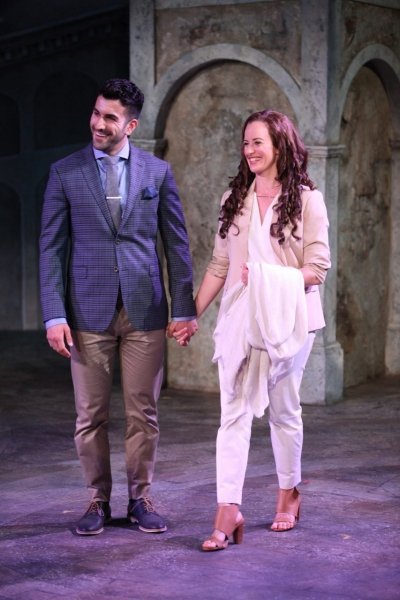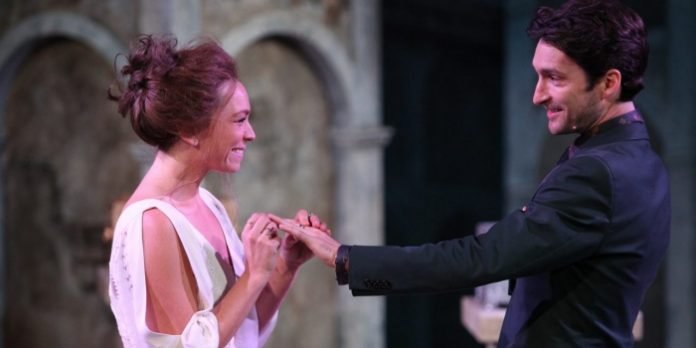Once you surrender to director Nigel Shawn Williams’s modern take on The Merchant of Venice there are huge payoffs.
In this Bard on the Beach Shakespeare production, Williams has transplanted the story to present-day Venice. While Shakespeare’s text remains intact to tell the story of Shylock the moneylender and Portia’s quest for love, here the characters are dressed in modern, stylish Italian clothing from costume designer Drew Facey.
This is not the first Bard play this season to be given a more contemporary facelift, with the main stage production of Much Ado About Nothing transporting audiences to a 1959 Italian soundstage. But while Much Ado largely works with a justification of 1959 attitudes paralleling the text, it is a slightly different outcome in Merchant.
What makes Williams’s vision sometimes jarring is in an attempt to rationalize the text against this shift in time. With great chunks of the story at odds inside a modern context, it takes time to get past its anachronisms and become fully invested.
Never mind the central premise of a pound of flesh extracted as payment for a defaulted loan, there are also questions as to Portia’s resignation in having her life (and love) controlled by her dead father. Similarly, it is difficult in a modern context to comprehend the weight Portia and Nerissa place on the rings given to their husbands Bassanio and Gratiano.
Once you let go though, there are huge payoffs, not only from a cast who are fully invested, but in its ability to challenge its audience.
Before addressing performance, there remains the question of the baggage which continues to dog this play. While the biggest of these is the ongoing debate over whether The Merchant of Venice is anti-Semitic – scholars are still at odds with each other on this front – director Williams tackles this notion in a broader sense.
In his program notes, Williams admits to approaching Merchant as a man of colour, and asserts The Merchant of Venice “is not a comedy but a warning of our impending collective tragedy if we don’t awaken.”
Under this lens, Williams forces a contextual view to match his vision for the play. Without the knowledge of this directorial perspective though, it is impossible to say whether Williams would have succeeded in this re-framing. His notes, at the very least, become required reading before the show.
Williams’s notes also open up a new layer of post-show discussions. Does the ethnicity of the director, or the large diversity of the cast, play into our acceptance of The Merchant of Venice’s xenophobic and anti-Semitic underpinnings? Are we conditioned to react with less outrage because of what we know, or are we only fooling ourselves into this conclusion?
Williams also says “art evokes emotions in us, and elicits a sense of honesty that we don’t practice in our everyday lives”. There is nothing more gratifying than a play which challenges our sometimes narrow view of the world. Here, Williams and his company are hugely successful.

Helping to bring Williams’s vision into focus are some terrific performances.
Kamyar Pazandeh, Nadeem Phillip, and Andrew Cownden are particular stand-outs.
Pazendeh as Gratiano and Phillip as both the Prince of Morocco and Duke of Venice bring a natural delivery to their roles which fits perfectly inside the contemporary setting. Somewhat surprisingly, Cownden makes Lancelet’s sometimes overly passionate speeches actually work.
As Portia, Olivia Hutt overcomes her odd place within Williams’s modern take and Charlie Gallant as her suitor is filled with an unbridled energy.
By contrast though, Edward Foy is constrained as Antonio, and a surprisingly passionate kiss is never explained or adequately foreshadowed to explain his demeanor.
Perhaps better known for musical theatre, Warren Kimmel gives a solid performance as Shylock. Arguably the play’s most difficult role, Kimmel remains a largely unsympathetic character, steering clear of any real villainy.
Scenic designer Marshall McMahen keeps things to a minimum, allowing projection designer Conor Moore room to map his images along the columns of his scaled Venetian towers.
On a personal note, even as I sat down to the write this review I had to try to at least acknowledge my biases.
I questioned every word. Are my assumptions correct? Is an attempt to view this production through the lens of this company’s diversity, both onstage and off, somehow in itself racist? Can I truly profess to understand this lens given my privilege?
I did take some solace in my belief that while we may approach things from a unique perspective, whether through experience or learned prejudices, real change can come from constantly questioning both.
This is the power of theatre and the real power of this production of The Merchant of Venice.
The Merchant of Venice by William Shakespeare. Directed by Nigel Shawn Williams. A Bard on the Beach Shakespeare Festival production on the Howard Family Stage in the Douglas Campbell Theatre at Vanier Park until September 16. Visit https://bardonthebeach.org for tickets and information.

